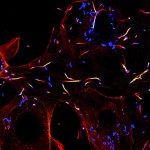Link to Pubmed [PMID] – 21248252
J. Immunol. 2011 Feb;186(4):1899-903
K/BxN serum-induced passive arthritis was reported to depend on the activation of mast cells, triggered by the activating IgG receptor FcγRIIIA, when engaged by IgG1 autoantibodies present in K/BxN serum. This view is challenged by the fact that FcγRIIIA-deficient mice still develop K/BxN arthritis and because FcγRIIIA is the only activating IgG receptor expressed by mast cells. We investigated the contribution of IgG receptors, IgG subclasses, and cells in K/BxN arthritis. We found that the activating IgG2 receptor FcγRIV, expressed only by monocytes/macrophages and neutrophils, was sufficient to induce disease. K/BxN arthritis occurred not only in mast cell-deficient W(sh) mice, but also in mice whose mast cells express no activating IgG receptors. We propose that at least two autoantibody isotypes, IgG1 and IgG2, and two activating IgG receptors, FcγRIIIA and FcγRIV, contribute to K/BxN arthritis, which requires at least two cell types other than mast cells, monocytes/macrophages, and neutrophils.


